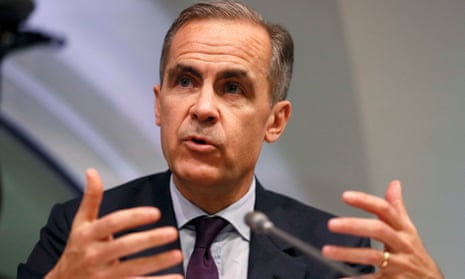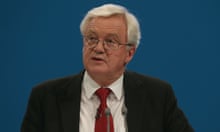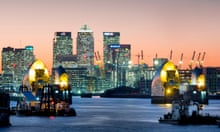The Bank of England has given financial firms a deadline of 14 July to explain how they are planning for the UK’s departure from the EU and warned them to be ready for all possible outcomes, including a hard Brexit.
The Bank wrote to hundreds of banks, insurers and other financial firms on Friday ordering them to get contingency plans in place. The move follows prime minister Theresa May’s triggering of article 50 last week, formally launching the Brexit process.
Bank governor Mark Carney said central banks and financial firms should be planning for “all eventualities” as he used a speech in London to call for an open financial system between the UK and the EU post-Brexit (pdf).
A key concern for financial firms is whether the UK will still hold the passporting rights that allow British-based banks and insurers to do business with the rest of the EU after Brexit. Some companies have already unveiled plans to move jobs and operations out of the UK and the Bank is now calling on all those with cross-border activities between the UK and the rest of the EU to report back by 14 July.
Sam Woods, the Bank’s deputy governor for prudential regulation and head of the Prudential Regulation Authority, wrote in Friday’s letter: “Many firms are well-advanced in their planning and have engaged closely with the PRA as part of that process. However, our current assessment is that the level of planning is uneven across firms and plans may not be being sufficiently tested against the most adverse potential outcomes.”
Carney said the main purpose of the letter was to ensure “all firms are making, and stand ready to execute in good time should the need arise, contingency plans for the full range of possible scenarios”.
As the UK and EU governments prepare for tough Brexit negotiations, Carney used his speech to challenge those who want to cut the UK’s access to the rest of Europe. He urged politicians not to give in to protectionism on banking rules but to keep an open financial system.
Highlighting what he believes is at stake if Brexit results in the City being cut off from the rest of Europe, Carney sought to portray London as a key part of the global financial system and reiterated his earlier claim that “London is Europe’s investment banker”.
He said that repair work to the financial system since the global crisis had made it safer, simpler and fairer and that the UK had gone beyond the minimum global standards, meaning others could rely on it as a “pillar of strength for the international monetary and financial system”. But, describing Brexit negotiations as a “litmus test for responsible financial globalisation”, Carney suggested such gains were now at risk.
“A decade of hard fought financial reform creates enormous opportunities,” Carney said in a speech at Thomson Reuters in London’s Canary Wharf on Friday. “It is all too easy to give into protectionism, but the road less taken is often the most rewarding.”
He made his case for an open financial system by describing a high road and a low road.
“We are at a fork in the road,” Carney said. “One path builds on the foundations of a new responsible global financial system that are being put in place … The high road leads to more jobs, higher sustainable growth, and better risk management across the G20,” he added, referring to the G20 group of mainly rich nations.
“But there is another path – the low road – where trust and cooperation diminish, fragmentation hardens, capital flows are disrupted, and trade and innovation are curtailed.”
The low road would be “sub-optimal for all, with fewer jobs, lower growth and higher domestic risks”, he added.
Carney has previously warned that European economies could be damaged if their access to the City of London was disrupted after Britain leaves the EU. On Friday, he reiterated that more than half the equity and debt raised for European governments and business was raised in the UK.
Carney called for the EU and UK to agree on rules to ensure money can continue to flow easily between countries, but he said he was not demanding a deal for financial services that was separate from a wider trade deal.
“We fully recognise that the negotiations around financial services are one sliver, albeit an important sliver, but a sliver of a much wider set of discussions that the UK and the EU have just embarked upon,” he said.
Carney described the EU and UK as already “ideally positioned to create an effective system of deference to each other’s comparable regulatory outcomes, supported by commitments to common minimum standards and open supervisory cooperation”.
Worries about a hard Brexit that leaves UK-based financial firms with little access to the EU have forced many companies to unveil plans to move jobs out of London. That in turn has prompted warnings about a blow to tax revenues for the exchequer and to the UK’s economic growth prospects.
The insurers Lloyd’s of London and Royal London are setting up subsidiaries outside the UK, while the investment banks JP Morgan and Citigroup are actively exploring the relocation of key operations. Goldman Sachs is to move hundreds of bankers to Frankfurt and Paris, while HSBC could switch 1,000 investment banking jobs from London to Paris.











Comments (…)
Sign in or create your Guardian account to join the discussion